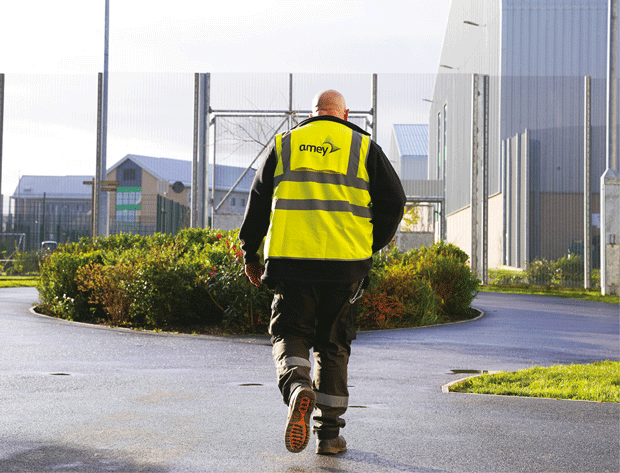 Craig McGilvray, Managing Director, Amey Complex Facilities explains to Sara Bean how a change of ownership offers the asset and FM services provider the opportunity to broaden its reach
Craig McGilvray, Managing Director, Amey Complex Facilities explains to Sara Bean how a change of ownership offers the asset and FM services provider the opportunity to broaden its reach
It’s been an eventful few years since Craig McGilvray became Managing Director for Amey Secure Infrastructure (now Complex Facilities) in early 2020. Just six weeks after his appointment came the pandemic, in 2021 he oversaw the divestment of the critical infrastructure provider’s legacy utilities business and early this year, Amey UK completed its sale to UK investment firms One Equity Partner and Buckthorn Partners in a deal worth £400 million.
McGilvray however is unfazed by the changes and excited about the opportunities the new ownership presents. This is perhaps not surprising given his considerable experience in senior financial and commercial management roles within the facilities management and utilities sectors. He joined M&E business Stiell as Group Finance Director in 1996, and following its sale to Alfred McAlpine in 2002, moved into the Managing Director role for the Business Services Division, which he ran from 2004 to 2008 when it was taken over by Carillion.
After a few years running the Emprise cleaning business in London, in 2014 he joined Balfour Beatty as MD of its Gas and Water Division, which delivered engineering and project services to major UK and Irish utilities. He was appointed MD of Amey Infrastructure Services in 2020 with the remit of helping ensure the business was readied for sale by its Spanish owners Ferrovial.
COMPLEX FM
Speaking of the deal, which was finalised in January, McGilvray says: “Amey is a very high-quality brand and I think it’s got a positive culture. The problem was that under the previous ownership it was very risk averse, and the business wasn’t growing, so the biggest change is that the new owners are ambitious, they want the business to return to growth and want to expand the customer base.”
This current portfolio requires the delivery of asset and facilities management services for clients operating in complex environments – including defence, justice, education, and health across England, Wales, Scotland and Northern Ireland. This encompasses around 155 schools and colleges, 18,000 military homes and 60 prisons. Amey Complex Facilities is also one of the UK’s core defence contractors, maintains NHS estates for Birmingham and Solihull Mental Health Trust, and runs a number of workplaces for public sector organisations including National Highways, The UK Hydrographic Office, and local authorities.
Says McGilvray: “While Amey deep down feels similar to some degree to previously, it’s clear that the new investors want to do more for a wider set of customers. Following the collapse of Carillion, the Carillion-Amey venture ended up in my business and therefore it was dominated by defence. Our second largest activity was in the prison service, so the focus was entirely on the public sector, and we thought our selling points were working in that kind of environment.”
The new owners want to look at a broader customer set, so amid discussions about seeking business to business rather than exclusively concentrating on business to government came the name change from Amey Secure Infrastructure to Complex Facilities. According to McGilvray, the new name gives them access to a much broader area to work with.
He explains: “Our thinking is that it is not just us that carry out complex engineering solutions, but our customer estates are complex to manage and work for, so we thought it was a name which was self-explanatory, one that is broader than secure infrastructure and reflects the fact that we have customers who have complex needs that play to our skills.”
GOING FOR GROWTH
Over the past few months, the firm has had a lot of successes on the public sector project framework side, where McGilvray remarks they have the pedigree to present an offering that is compelling for its customers. “We haven’t achieved this yet in the FM side but there is plenty of opportunity ahead of us in this market.”
Within the private sector, while he can’t envisage landing contracts within for example financial services, he’s positive about the contribution Amey could make in areas like logistics and warehousing, which are entirely dependent on the M&E services to run efficiently, and which need help in transitioning into more energy efficient sources such as renewables.
Regarding the public sector, he says: “We’re living in a very long shadow of the pandemic and while it has allowed more flexibility and ways of working, the public sector is still trying to figure out where and how their workforces will want to operate in the future. Given the impact of the cost-of-living crisis, the other challenge is money. Value for money was always important for the public sector customer, but the need to do more for less may make them take decisions faster than previously.
“Currently, we’re working collaboratively with the Department for Work and Pensions (DWP) and our supply chain to create workplaces that will encourage people back in to public buildings.
“Then there is meeting the net carbon challenge. Here you can spend a lot of time thinking and talking – so I got to the point of saying ‘let’s pick a school and go in and see what we can actually do’.”
The Amey team carried out a full analysis of what to do with the chosen school’s building infrastructure to help with the decarbonise process, with the purpose of creating a menu set that can be applied across the entire education estate.
“We first looked at the cost-free options. You can save about 10 per cent of energy bills by spending no money then look at swapping off older kit, not because it doesn’t work but because it’s energy inefficient. Then you move to the harder things like getting rid of gas heating which is a longer-term goal.”





